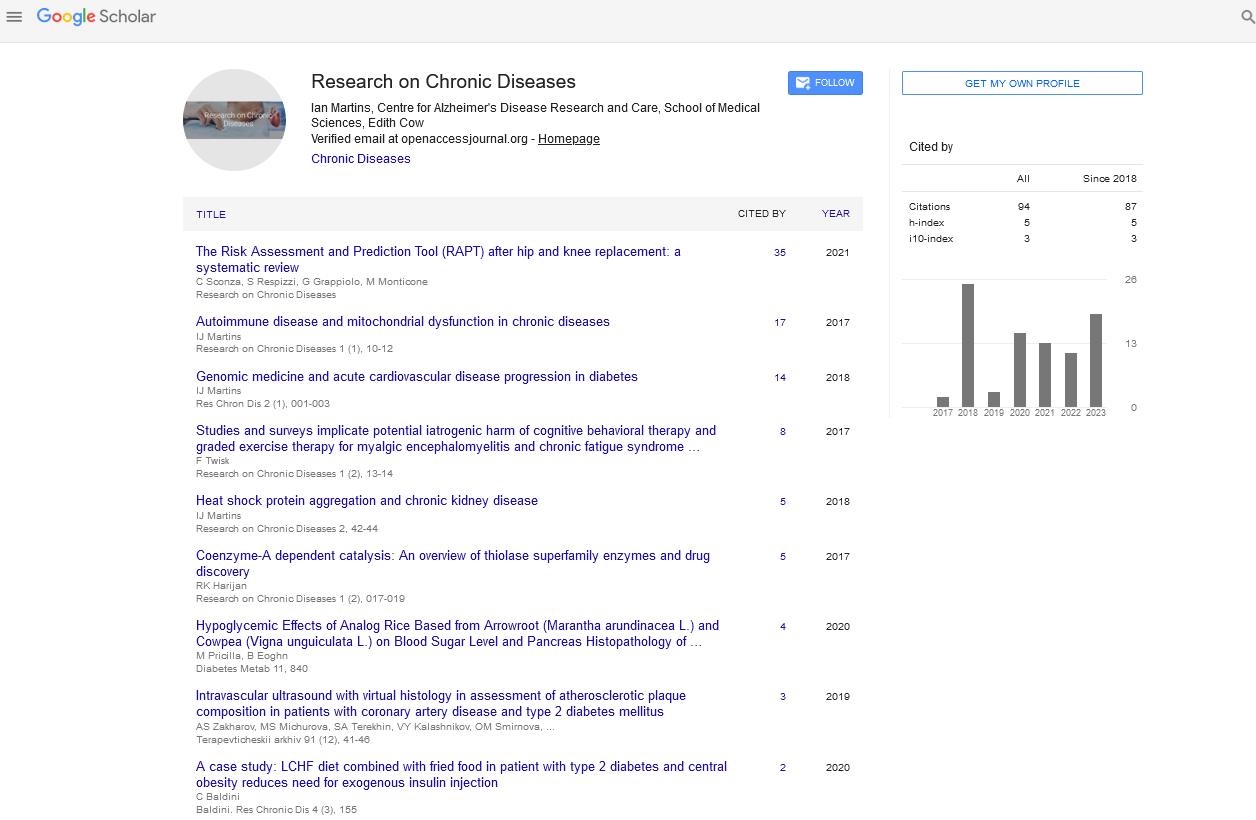Biography
Dr. Ian Martins has been invited to join the Editors of various international journals and has been a reviewer for various journals (approx. 40). He was appointed as the Chief Editor for International Journal of Diabetes Research (2014-2017). He is a BIT Member (BIT Congress. Inc) with an H-index of 43, (ResearchGate STATs (23), Mendeley STATS (20). The total citations over the past 27 years of scientific research has accumulated to 2900. ResearchGates analysis available on google, Tweet, Facebook, Lindekin under Ian James Martins name places Dr Martins publication stats RG score higher than 96% of the international researchers and is now a SCIENTIST (ResearchGate). He is now a Scientist for The Science Advisory Board (USA). He has reached the top 3% of Academia.edu. researchers and is a connecting researcher with ORCID. Prevention of over eating by food restriction improves liver lipid metabolism and nature of fat consumed is important to improving health. Contribution to biology is the peripheral sink abeta hypothesis and its relevance to organ suicide, diabetes and Alzheimers disease. Dr Martins has received certificates of recognition at various international conferences, world congress and conventions in relation to anti-aging, health and disease. Keynote addresses at Innovate Pharma 2017, Innovate Neurology 2017, World Diabetes and Endocrinology Summit-2017 and Pharmacology and Ethnopharmacology 2016 has been completed with relevance to the current global epidemic on chronic diseases. Invited 1st Plenary Speaker at the Annual Global Health Conference 2016 with relevance to Nutritional diets accelerate amyloid beta metabolism and prevent the induction of chronic diseases and Alzheimers disease. Photon ebooks (Dr Ian Martins was conferred with the RICHARD KUHN RESEARCH AWARD-2015 ENDOCRINOLOGY AND METABOLISM).
Research Interest
His current research into links between diet, diabetes and neurodegenerative diseases builds upon his past experiences and generates outputs that will have relevant and significant impact to the community. The incidence of diabetes has been predicted to increase to 21% by 2050. In various continents the rise in the global diabetes epidemic has been associated with diseases of various organ diseases related to obesity, diabetes and neurodegenerative diseases (Parkinson?s disease and Alzheimer?s disease). Nutritional Research involves appetite regulation with improvement in health relevant to chronic disease progression. Key words: Anti-Aging Genes, Appetite, Environment, Nutrition, Senescence 1.Global diabetes may explain the increased risk for AD in the Western populations and overide the apo E4 genotype effects with the apparent inadequacies of apo E4. Therapeutics to control and stabilize the severity of the metabolic syndrome and diabetes in various Western communities is required to prevent mental illness that is connected to the lifespan of diabetic individuals with neurodegeneration. 2.Nutritional therapy and appetite control has become of central importance as early nutritional therapy may assist to delay liver and brain disease associated with diabetes and aging. High fibre diets contain various fatty acids such as the short chain fatty acids (SCFA) and the understanding of synergistic effects of SCFA and phytosterols in glucose regulation and cholesterol homeostasis are important to our understanding of diet, lifestyle and drugs in relation to the liver that plays an early role in the development of AD. 3.Anti-aging therapies such as diet, exercise and selective drug therapy early in life may prevent calorie overload and activation of calorie sensitive genes (Sirtuin 1) control genotoxic stress in diabetes that accelerates aging, Parkinson?s disease and AD. 4.Environmental factors such as stress, anxiety and depression are important to consider with the global increase in chronic diseases such as cardiovascular disease, cancer, stroke, obesity, diabetes and neurodegenerative diseases. Brain metabolic diseases associated with conditions such as obesity and diabetes require early intervention with diet, lifestyle and drug therapy to prevent diseases to organs such as the liver with non alcoholic fatty liver disease (NAFLD). The liver is actively involved in the metabolism of amyloid beta (peripheral sink abeta hypothesis). 5.Molecular neuroendocrine disturbances (diagnosis) that cause appetite dysregulation and overeating are closely linked to reduced lifespan and neurodegeneration. The origins of metabolic diseases that afflict various organs possibly arise from hypothalamic disturbances with loss of control of peripheral endocrine hormones and neuropeptides (diagnosis) released from the brain. 6. The promise of appropriate diets (low palmitic acid), lifestyle and drugs that target the CNS and peripheral tissues such as the adipose tissue, liver and pancreas may improve the prognosis of chronic diseases such as obesity and diabetes that are also closely associated with neurodegeneration. Technologies such as Lipidomics presents a novel technology to advance discovery medicine that detects lipid mediators (diagnosis) in the plasma that are connected to the amyloidogenic pathways and allow drug and lifestyle intervention early in life to delay aging and neurodegeneration. Other technologies such as Proteomics has advanced and identified various plasma proteins (diagnosis) that may be implicated in lesions in brains from neurodegenerative individuals. Hepatic acute phase proteins induced by inflammation and oxidative stress in health conditions such as obesity and diabetes have important roles in anti-amyloidogenic or amyloidogenic roles and are connected to the pathophysiology of neurotoxic diseases. Proteomics (diagnosis) in AD has become important since identification of plasma biomarkers such as the acute phase proteins that include pentraxins regulate or reduce amyloid beta sizes that are related to membrane permeability and disruption.
